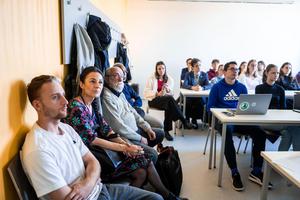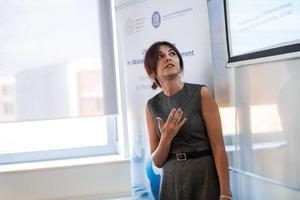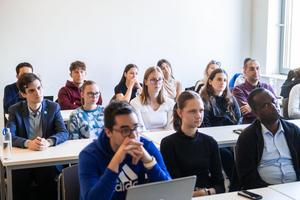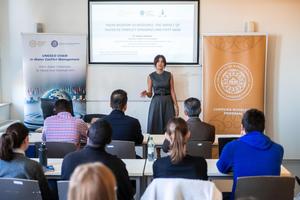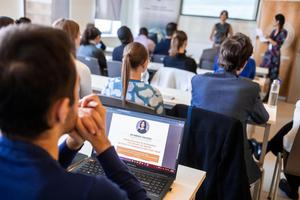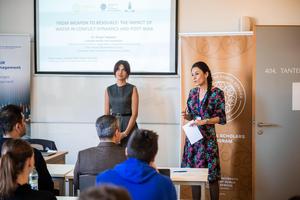Between 13–17 October 2025, the Faculty of Water Sciences of the Ludovika University of Public Service (LUPS) had the honor of hosting Dr. Nargiz Uzeir Hajiyeva, researcher at the Azerbaijan State University of Economics (UNEC) and Chair of the Women Researchers Council, who visited Hungary as part of the Ludovika Scholars Program. The distinguished guest lecturer spent an inspiring and productive week in Hungary, participating in several professional meetings, discussions, and lectures.
Throughout the week, Dr. Hajiyeva took part in a series of institutional visits. She met with Dr. Tibor Bíró, Director of the Institute for Environmental Sustainability, and held consultations with Dr. Tamás Pálvölgyi, Vice-Dean for Strategy and International Affairs of the Faculty of Water Sciences, as well as with lecturers from the Department of Water and Environmental Policy. She also visited the National Laboratory for Water Science and Water Security, where she exchanged views with Dr. Éva Ács and her research team, and held discussions with representatives of the UNESCO Chair in Water Conflict Management.
On 14 October, Dr. Hajiyeva held a highly successful hybrid-format workshop at the Ludovika Campus Educational Building, titled “Blue Gold in Power Politics: How Water Shapes Conflict and Cooperation in the 21st Century.” The event attracted record-breaking interest, with more than one hundred participants — including students and lecturers from the Faculty of Water Sciences in Baja — joining in person and online. The workshop explored how water has become both a source of geopolitical rivalry and a catalyst for international cooperation in the 21st century. Through the examples of the Nile, Indus, and Mekong river basins, the guest lecturer illustrated how water management intertwines with political, economic, and social power relations. Special emphasis was placed on the role of data sharing and institutional cooperation in conflict prevention, as well as on the importance of transparency and scientific evidence in water policy decision-making.
Dr. Hajiyeva also presented case studies on water-related conflicts in the Caucasus and Central Asia, and discussed the water-related consequences of the war in Ukraine, stressing that the destruction of water infrastructure leads to both humanitarian and ecological crises. Her presentation highlighted that water as a resource is becoming an integral part of strategic security, making international legal and scientific cooperation essential for sustainable solutions.
As part of the Ludovika Scholars Program, on 16 October, Dr. Hajiyeva delivered her second public lecture, titled “From Weapon to Resource: The Impact of Water in Conflict Dynamics and Post-War,” also held at the Ludovika Campus Educational Building. This event likewise drew exceptional attention, with more than one hundred participants following the lecture on-site and online. The lecture focused on how the green transition and sustainable development are not only environmental issues, but also economic and social challenges. Using the examples of Azerbaijan and Hungary, Dr. Hajiyeva demonstrated how national economic growth impacts the ecological environment and how genuine progress can be achieved through the promotion of green entrepreneurship, empowering women entrepreneurs, and educating younger generations in environmental awareness. She devoted special attention to green innovation, renewable energy production, and smart urban development, presenting recent Azerbaijani initiatives such as the Ganja Green City Action Plan and the Karabakh Green Energy Zone. Dr. Hajiyeva emphasized that professionals working in the field of water and environmental policy need an interdisciplinary approach: beyond technical knowledge, economic, social, and communication skills are also vital for building a sustainable future.
A key objective of Dr. Hajiyeva’s visit was to strengthen international academic cooperation. During her stay, she held meetings with several leaders and researchers of the University of Public Service to explore possibilities for future joint research projects and student mobility programs. To conclude the program, Dr. Hajiyeva also visited the Hungarian Parliament, gaining insight into the historical and institutional background of national decision-making.
The visit of Dr. Nargiz Uzeir Hajiyeva represented a remarkable academic and community event for the Faculty of Water Sciences. Her lectures offered new perspectives on water policy and sustainability, while also contributing to the promotion of women’s participation in science and the strengthening of international scientific dialogue. The events organized within the Ludovika Scholars Program clearly demonstrated how the themes of water science and the green economy can be interlinked on global, regional, and local levels through the combined efforts of education, research, and diplomacy.
